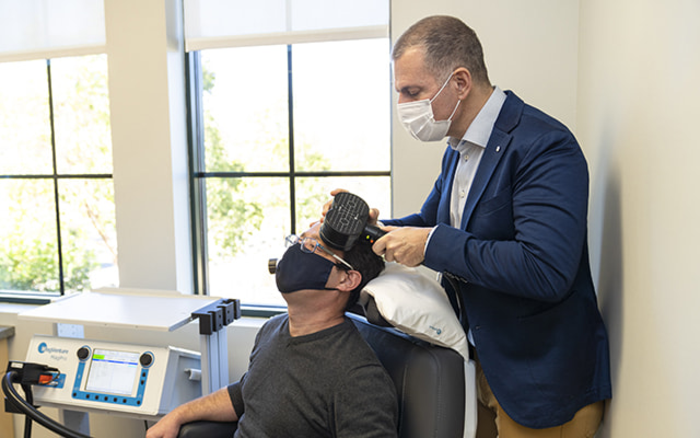Researchers at University of California San Diego School of Medicine, Weill Cornell Medicine and Stanford Medicine have launched a collaborative, three-year study to investigate new ways to treat or prevent major depression, accelerate application of effective treatments and develop predictive models to identify which treatments may work best for individual patients.

Credit: UC San Diego Health Sciences
Researchers at University of California San Diego School of Medicine, Weill Cornell Medicine and Stanford Medicine have launched a collaborative, three-year study to investigate new ways to treat or prevent major depression, accelerate application of effective treatments and develop predictive models to identify which treatments may work best for individual patients.
It’s estimated 21 million adults in the United States have experienced at least one major depressive episode in their lives, or slightly more than 8 percent of all American adults. Major depression is characterized by changes in mood, with cognitive and physical symptoms.
The contract is part of a $50 million effort by Wellcome Leap, a U.S.-based non-profit founded by the Wellcome Trust to accelerate breakthroughs for global health. Wellcome Leap is built on a unique model of innovation practiced at the U.S. Department of Defense’s Defense Advanced Research Projects Agency (DARPA), with the mission of funding novel, unconventional projects that target complex human health challenges.
Specifically, the contract will support a program called “Multi-Channel Psych: Revealing Mechanisms of Anhedonia.” Anhedonia is the inability to feel pleasure, and is a common symptom of depression and other mental health disorders.
“Depression is not a singular condition, and there is no singular remedy,” said Zafiris “Jeff” Daskalakis, MD, PhD, chair of the Department of Psychiatry at UC San Diego School of Medicine, who will co-lead the program with Conor Liston, MD, PhD, associate professor of psychiatry and neuroscience in the Feil Family Brain and Mind Research Institute at Weill Cornell Medicine and Nolan Williams, MD, assistant professor of psychiatry and behavioral sciences at Stanford Medicine. “It is an extraordinarily complex disease that, in many ways, is not yet well-understood. It is a different disease in every person, and every person requires a personalized therapeutic strategy.”
Currently, depression is most often treated with psychotherapy or pharmaceutically with drugs that target specific brain mechanisms, such as selective serotonin reuptake inhibitors (SSRIs). For many patients, these approaches are an effective first step and work well, but in roughly one-third of patients, drug therapies do not work at all.
Liston, Williams, Daskalakis and colleagues will focus on current and new uses of transcranial magnetic stimulation (TMS), a non-invasive procedure in which series of short magnetic pulses stimulate nerve cells in areas of the brain known to be associated with major depression. UC San Diego Health was the first provider of TMS in San Diego for individuals with treatment-resistant depression and operates the largest TMS clinic in the region.
“TMS requires patients to come to the clinic daily, and medications do not,” said Liston at Weill Cornell Medicine. “So for many people, medications are a good first treatment to try, but TMS is a great option for people who do not respond to medications.”
Patients during the three-year study will receive various treatments at the three sites, including a combination of the antidepressant escitalopram, known by its brand name Lexapro, and different types of TMS. Escitalopram is one of the most commonly used first-line SSRI treatment for depression.
Patients will be evaluated through clinical assessments and brain scans, with the ultimate goal of developing algorithms that can match individual patients with personalized treatment plans.
# # #
Subject of Research
People




